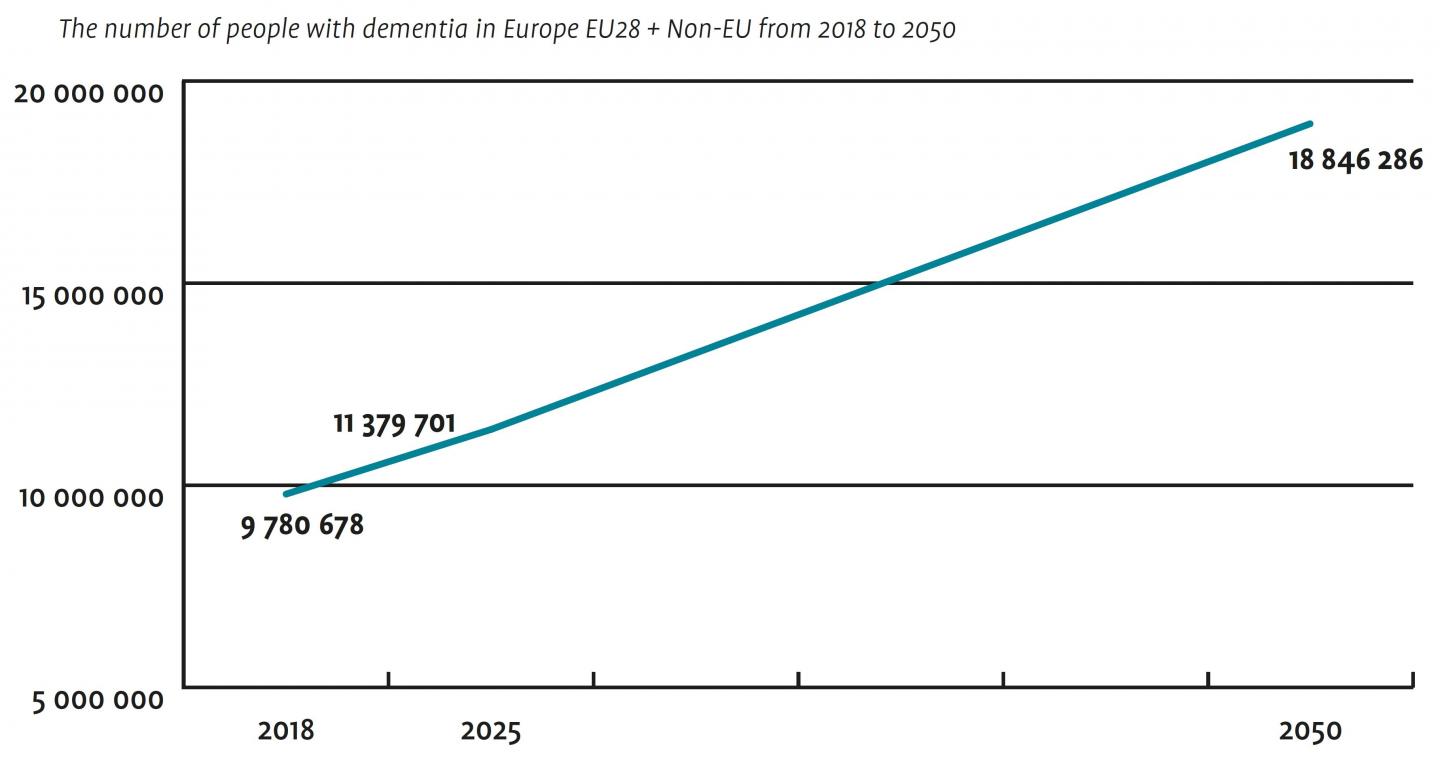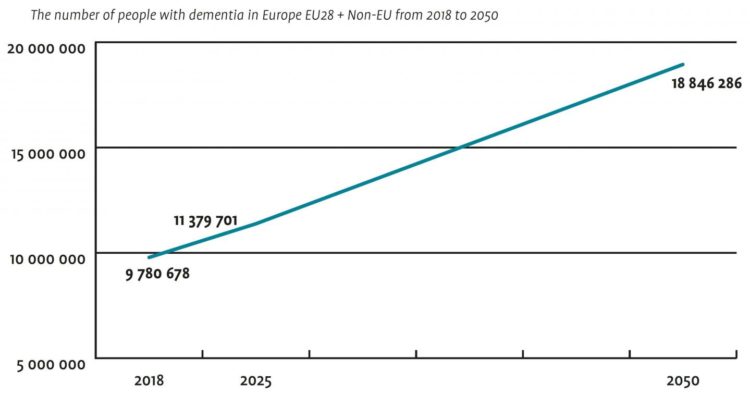
Credit: Alzheimer Europe
Brussels, 18 February 2020 – Today, at a European Parliament lunch debate hosted by Christophe Hansen MEP (Luxembourg), Alzheimer Europe launched a new report presenting the findings of its collaborative analysis of recent prevalence studies and setting out updated prevalence rates for dementia in Europe.
Over the past three decades, a number of significant pieces of work have been undertaken to estimate the prevalence of dementia at a European level, including:
- EURODEM study in the early 80s (updated in 2000)
- Alzheimer Europe’s project European Collaboration on Dementia – EuroCoDe (2006-2008)
- ALCOVE, the 1st EU Joint Action on Dementia (2011-2013).
As the most recent of these studies is six years old, Alzheimer Europe recognised the importance of establishing more recent dementia prevalence estimates, using the most up-to-date academic literature on the subject.
The findings presented below are based on a collaborative analysis of prevalence studies published since the conclusion of the EuroCoDe project. A total of 16 studies meeting predefined quality criteria were included in the collaborative analysis.
The key findings of this new Alzheimer Europe report include:
- For men, there has been a reduction in the prevalence of dementia across all age groups over the past ten years when compared to Alzheimer Europe’s 2008 EuroCoDe estimates.
- For women, apart from the age group of women between 75 and 79 years, there has been a reduction in the prevalence of dementia over the past ten years when compared to EuroCoDe.
- The number of people living with dementia in the European Union (EU27) is estimated to be 7,853,705 and in European countries represented by AE members, 9,780,678. Compared to its earlier estimates, this constitutes a significant reduction from 8,785,645 for the EU27 and from 10,935,444 for the broader European region.
Women continue to be disproportionately affected by dementia with 6,650,228 women and 3,130,449 men living with dementia in Europe. - The number of people with dementia in Europe will almost double by 2050, increasing to 14,298,671 in the European Union and 18,846,286 in the wider European region.
Alzheimer Europe’s Yearbook also highlighted significant limitations in the available research into dementia prevalence and a lack of research into:
- the prevalence of younger people with dementia (i.e. those aged under 65)
- the prevalence of different types of dementia
- the number of people affected by different stages of dementia including mild cognitive impairment
- the prevalence of dementia of people from ethnic minority groups.
Commenting on the findings, Alzheimer Europe Executive Director, Jean Georges, said:
“It is promising to see that healthier lifestyles, better education and improved control of cardiovascular risk factors seem to have contributed to a reduction of the prevalence of dementia. However, our report also demonstrates that the number of people living with the condition is set to increase substantially in the years ahead, which will only place greater pressure on care and support services unless better ways of treating and preventing dementia are identified. If people with dementia, their families and carers are to receive the high-quality and person-centred care they need, governments must ensure their health and care systems are ready to meet this demand and greater investments in research into the treatment and prevention of dementia are needed.”
###
For further information, contact:
Owen Miller, Policy Officer of Alzheimer Europe, 14, rue Dicks, L-1417 Luxembourg, Tel.: +352-29 79 70, Fax: +352-29 79 72, [email protected], http://www.
The 2019 Yearbook “Estimating the prevalence of dementia in Europe” received funding under an operating grant from the European Union’s Health Programme (2014-2020). The policy report was authored by Project Officer Christophe Bintener and Policy Officer Owen Miller. It can be purchased or downloaded via the AE website: https:/
Notes to editors
Alzheimer Europe is the umbrella organisation of national Alzheimer associations and currently has 39 member organisations in 35 European countries. The mission statement of the organisation is to change perceptions, practice and policy to ensure equal access of people with dementia to a high level of care services and treatment options.
Countries covered:
Alzheimer Europe calculated the numbers of people with dementia living in the European Union (EU27) and the countries represented by the organisation’s members (EU27 + Bosnia and Herzegovina, Channel Islands, Iceland, Israel, Montenegro, North Macedonia, Norway, Switzerland, Turkey and United Kingdom).
Background information:
In 2008, Alzheimer Europe published the results of its meta-analysis of prevalence studies published between 1998 and 2008. This meta-analysis was part of its European Collaboration on Dementia – EuroCoDe project.
The findings presented above are based on a collaborative analysis of prevalence studies published since the conclusion of the EuroCoDe project. A total of 16 studies meeting predefined quality criteria were included in the collaborative analysis.
Media Contact
Owen Miller
[email protected]





